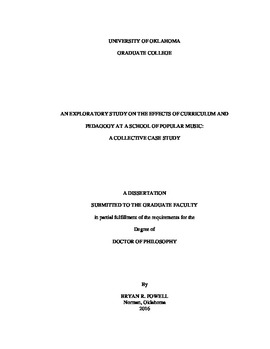| dc.description.abstract | Music educators today are faced with the challenge of bridging the gap that exists between conventional music curricula and the music with which many students engage on a daily basis. As a result, popular music is being incorporated into the curricula in a variety of ways. While this often occurs within a traditional music program, the emergence of autonomous schools of popular music is becoming more common. These post-secondary schools resemble music programs at traditional institutions of higher education, but singularly focus their instruction on popular music styles. To date, no research has been found concerning the curricular content and pedagogical methods employed at these schools. Therefore, the purpose of this study was to explore the effects of curricular content and pedagogical approaches on the lived experience of a teacher, a student, and an administrator at a school of popular music.
A collective case study design was utilized for the current qualitative study. The uniting issue for this study was the curricular content and pedagogical approaches at a school of popular music, while the multiple cases were chosen based on their roles within the school. A teacher, student, and administrator were selected from within the school to serve as participants who represented a maximum variation of roles, and therefore perspectives on the issue. Data were collected through interviews with the participants as well as through observations and video recordings of classroom instruction. Data analysis was conducted using a constant comparative approach, first within each case, followed by a cross-case analysis of the data.
Careful analysis of the data revealed a constructivist approach to instruction similar to the informal music pedagogy set forth by Lucy Green. Because of the informal learning style of many popular musicians, formalizing a curriculum that was acceptable to students, teachers, and administrators proved to be a challenging task. Informal pedagogical methods, such as self-directed instruction, were more easily incorporated into the formal educative structure and, therefore, viewed more positively by the study participants. In the end, it became clear that participants’ learning styles before entering the school greatly influenced their lived experience with the curriculum and pedagogy at the school. | en_US |
